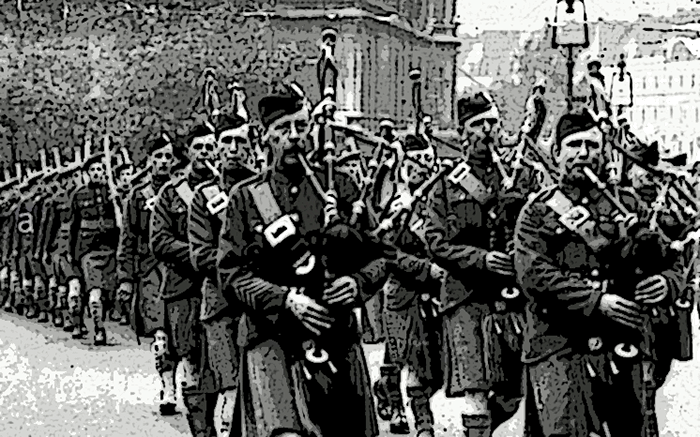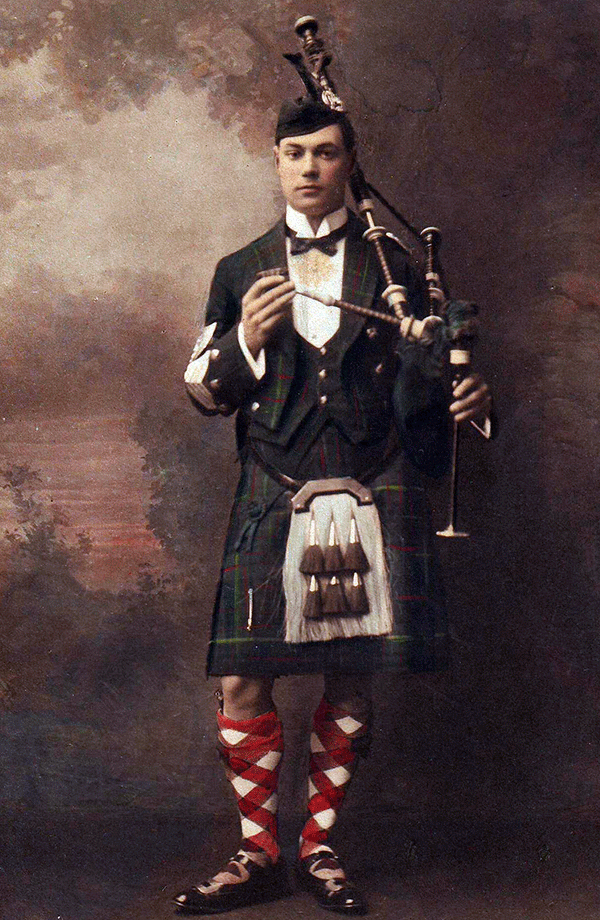
The third excerpt from Jeannie Campbell’s history of piping 1939-1945 …….
The Royal Scottish Pipers’ Society in Edinburgh held their AGM in November 1939 and it was decided that meetings of the Society would continue. Officials were appointed for a period of six months to fill the gaps caused by members away on service duty. Eighteen members of the Society were killed during the war.
On 30th September 1939 the Highland Pipers’ Society [another piping society based in Edinburgh] made the following announcement after their AGM: ‘It was agreed that an effort should be made, notwithstanding the present lighting restrictions, to resume practice meetings even although a number of prominent members have already been appointed to posts in Scottish regiments.’
There was a good turn out at the December meeting, when the players included Pipe Majors William Ross (Edinburgh Castle), James Sutherland, James O. Duff and Messrs. Malcolm Johnston, Ian MacIntosh and R Arnott. The Highland Pipers’ Society held a competition in Edinburgh on the 22nd April 1944.
The prize list included some famous names:
March aged 15 and over: 1 W Cowie 2 R Thomson 3 A Maclaren
Strathspey & Reel 15 and over: 1 J Ross 2 R Kilgour 3 W. Cowie
March under 15: 1 John Burgess 2 Iain Cockburn 3 A Campbell
Strathspey & Reel under 15: 1 John Burgess 2 A Campbell 3 Iain Cockburn
MSR under 15: 1 John Burgess 2 Iain Cockburn 3 A Campbell
MSR 15 and over: 1 G Cockburn 2 J Ross 3 R Thomson
The Scottish Piping Society of London was still functioning during the early part of the war, but by October 1940 they had found it impossible to continue.
Their annual dinner was held in the Milestone Hotel, Kensington, in March 1940. Among those present were some well-known figures, the President Lewis Beaton, Major David Manson, P/M David Ross and Dr William MacPhail. Several members gave piping selections during the evening and pipers from the Scots Guards played also.
Later that year the air raids on London made it impossible for members to get home from meetings so these were cancelled. Anyone in town when a raid started might have to spend the whole night in an Underground station.
One member, David Ross, had served as a Pipe Major during the First World War and had won all the major solo piping prizes. He was engaged in the silk business in London. One morning in the winter of 1940-41 he arrived at his business premises to find the building had been bombed by the Luftwaffe.

That in itself was a bad blow, but returning home a few hours later there were only skeleton walls where his house had stood and ARP men had just completed the task of rescuing Mrs Ross from the debris. With the survival of Mrs Ross and of his pipes David considered himself very lucky. Things might have been much worse.
Still in the capital, the London Scottish was one of the most democratic regiments in the British Army as most of the officers had served in the ranks, many as pipers and drummers. On one occasion a band comprised solely of officers played in the Drill Hall at Buckingham Gate with a colonel acting as Pipe Major.
Regimental Pipes & Drums WW2 history extract: ‘The outbreak of war again saw the London Scottish Regiment rise to the occasion and with them, the Pipes and Drums. Again, three Battalions were formed, two under the parentage of the Gordon Highlanders and the 3rd Battalion as part of the Royal Artillery.
‘All three Battalions built their Pipes and Drums and ensured that they were an integral part of the fighting force. The 1st and 3rd Battalions fought throughout the Italian campaign, whilst the 2nd Battalion remained in the UK as a reserve force. Pipers and Drummers from the 1st and 3rd Battalions were killed and injured in the course of the war, whilst three bass drummers won the Military Medal.’ In all the London Scottish lost 382 men during WW2. Read more about the regiment here.















